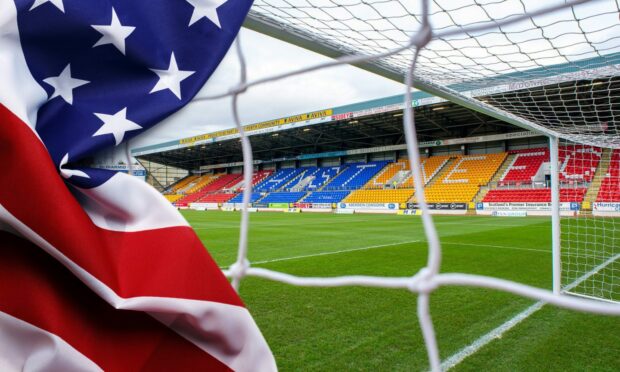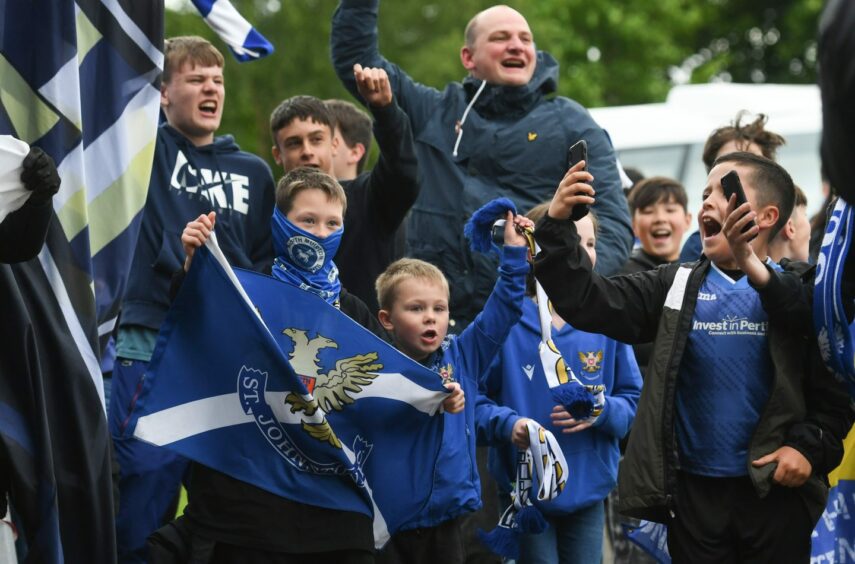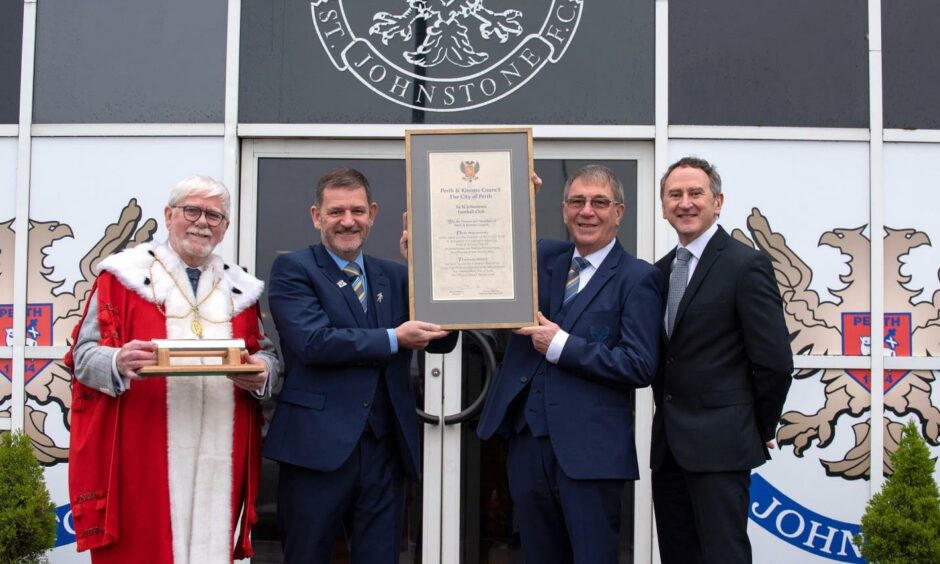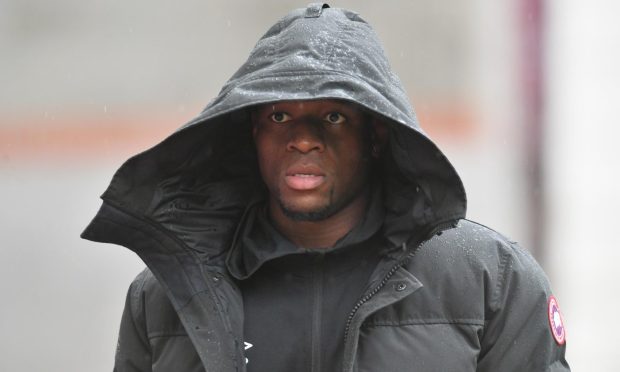Geoff Brown has put his controlling shares in St Johnstone up for sale.
The news was announced in the same week as his son Steve confirmed he would be stepping down as chairman at the end of the season.
The Perth club has been under the family’s stewardship for nearly 40 years, in which time three trophies have been won.
Saints are established as a Premiership side, with the recently-released annual accounts revealing a £1m profit in the last financial year and over £5m sitting in the bank.
Courier Sport spoke to renowned football finance expert and author of The Price of Football, Kieran Maguire, to assess the likelihood of the Browns finding a buyer and where that buyer may come from.
Courier Sport: St Johnstone have been a financial success story for as long as the Browns have been in charge. What has been the key to that?
Kieran Maguire: “They’ve got a strategy. And it works.
“Have a picture and stick to it.
“Don’t try to live beyond your means is a very sensible plan.
“You don’t twist on 19.
“If you do twist on 19 you’ll win occasionally but the vast majority of the time, you won’t.
“They’ve got it right.
“People will say: ‘Oh, that’s boring’.
“But St Johnstone fans will be able to take their kids and their grandkids to watch their team if they keep getting owners to run their club like that.
“People are interested in football stories that have me diving among the weeds and I’ve never been as busy as I am now.
“I’d certainly be very happy if there were more stories like St Johnstone’s!”
CS: Because there is over £5 million in the bank, they’ve just announced a record turnover of £8 million and a profit of over £1 million and they have 22 acres of land, there’s a school of thought that an impeccably run club is actually harder to sell than one that needs turning around. Would you agree?
KM: “It makes it easier to sell.
“Whoever buys the club will be buying into future cash-flows.
“If you’ve got a club which is hemorrhaging cash because there’s no control over wages it will take a couple of years for those player contracts to expire.
“Also, you can sometimes takeover a club and inherit its debts.
“The fact that St Johnstone has more cash than debt can’t be described as anything other than a positive.”
St Johnstone's annual accounts the envy of Scottish football ⬇️⬇️⬇️ https://t.co/dGRIQcHaCf
— Eric Nicolson (@C_ENicolson) December 9, 2022
CS: Geoff Brown has said the net proceeds of the sale will go to the St Johnstone Community Trust. What does net proceeds actually mean?
KM: “It will be the total price, less any outstanding money owed to the owners.
“That would be my understanding of the phrase.
“But Roman Abramovich made a comment about net proceeds when he was talking about selling Chelsea and we have to be a little bit careful because there’s no statutory definition.
“What I would say is that given what the Browns have done for the club, they’ve got an exemplary record, so there’s almost certainly nothing to worry about with the term.”
CS: There was rumour that £8 million was being talked about for any possible sale of the club a few years ago. Would that feel about right as a ball park figure just now?
KM: “You have to look at what is getting bought.
“I don’t know enough about property prices in Perth but if you’re acquiring all of that land along with the football club, it has development potential for the club and/or alternative use.
“In those circumstances, £8 million would seem to be a fair price.
“It’s certainly not excessive.
“It would reflect the fact that you would be getting a business that isn’t losing money, has cash in the bank and has shown it has the ability to generate more.”
CS: Does the fact that the net proceeds will be going to the Community Trust impact on a sale in anyway at all, either making it more or less likely? To put it another way, would we be right in thinking Geoff Brown is less likely to be a seller who will try and squeeze the last pound out of a buyer in these circumstances?
KM: “I would agree with that entirely.
“I’ve seen football club sales where everything has been agreed and then one of the parties tries to do the other one over at the last minute.
“That’s often on the selling side because they know that the buyer has paid legal fees, surveyor’s fees and has taken accounting advice.
“They’ll have spent a lot at that point and then can find the seller trying to nickel-and-dime them.
“On the face of this, because there’s no increasing benefit for the Browns themselves apart from wanting to do the right thing for the football club and the community trust, I think it could accelerate a sale.”
CS: Two fundamental questions which apply to St Johnstone are ‘why buy a football club and who would want to?’
KM: “I know Simon Jordan reasonably well. He’s an interesting bloke.
“He’s very good on the radio and it’s not an act. He speaks exactly the same on the phone, just with more swear words!
“He says that if you’re a football club owner the best two days are the day that you buy it and the day that you sell it.
“And what happens in between is a nightmare!
For all the gluttons for punishment … my audiobook is out , if you haven’t heard enough from me already ..
I know this will be of massive appeal to #mcfc and #nufc fans who so appreciate my views 🤥🤷♂️https://t.co/zx2zyGHaAR
— Simon Jordan (@Sjopinion10) June 15, 2022
“If you’re talking about £8 million that rules out 99.9% of the population immediately.
“You need to find somebody who wants a football club for the benefits it brings and also has the cash should times turn sour.
“In St Johnstone’s case, there’s no reason why that would happen, of course.
“The objective could be just being in the directors’ box two or three times a year when the big clubs come or liking the idea of seeing St Johnstone in Europe, that sort of thing.
“It could even be just to say to their friends – I own a football club in the Premiership.
“We all gravitate to people who are on our level socially. You win the room if you own a football club, don’t you.
“The person who wants the status symbol of owning a football club still exists. They are trophy assets.
“In my book, I wrote that there are four reasons to own a football club – profit, vanity, insanity and love.
“If it’s your local football club, you’ve supported them, you’ve been successful in business, you end up buying them and you run it well by making good decisions, that’s the best type of owner.
“Vanity/insanity is about the kudos and the ‘look at me’ side of things. ‘We’re playing Aberdeen on Saturday, do you want to come in the boardroom with me?'”
CS: With St Johnstone it wouldn’t be like at Dundee United or Dundee, for example, where the appeal is to restore former glories. They have won three cups in recent years and everything is going very well. Does that make it a less attractive purchase?
KM: “From an outsider’s perspective St Johnstone comes across as a homely club at the heart of its community.
“They don’t try to be in your face and are proud to represent their area and its people.
“That’s as far as it goes.
“And it’s actually really nice and appealing.
“These are the things I’d describe as ‘fluffy positives’.
“The danger would be a new owner who wants to change that.
“York City were bought by a trust in July and they then sold 51% immediately to a local businessman because he said he’d put money in to take the club forward.
“He then sacked the popular manager, made a lot of other bad decisions and a few months later the club is back up for sale.
“Things can turn sour.
“So getting someone who buys into the philosophy of St Johnstone is important.”
CS: There has been talk of St Johnstone selling their McDiarmid Park land and moving to a stadium with a smaller capacity. Does that stack up as a proposition or would it be making a move only to stand still?
KM: “The only reason to do that would be to sell the land as a whole property package and then use it for retail/residential/manufacturing development if you can get the council to buy into it.
“Clearly, the more land you can sell the bigger the price you can get.”
Aerial view of Perth, showing McDiarmid Park and N. Perth Crematorium (bottom). Pic: RCAHMS (1995) pic.twitter.com/KMb6djgPQx
— PictureThis Scotland (@74frankfurt) January 10, 2020
CS: By the sound of it, the likeliest buyer seems to be someone who knows a good going business when he or she sees one and intends to keep it moving along familiar lines and use the recipe for success?
KM: “That would make sense. St Johnstone have got a formula.
“There’s a textbook way to run a football club in place.”
CS: What about fan ownership?
KM: “The danger is that there’s an initial wave of enthusiasm and then within six months, 90% of the people who said they’d be interested have disappeared.
“You’ve then got a hardcore, some of whom might be very good but others whose ambition was always to be the person who chose the colour of the away kit.
“Often what happens is they sell to an owner who can put more money in.
“The idea of fan ownership is very romantic but when the bills are coming in and you need someone to pay, the rich owner model shows its worth.”
CS: The million dollar question – what’s the likeliest scenario for who buys St Johnstone?
KM: “I think the likeliest is the United States.
“There is a feeling in America that the Brits don’t know how to market sports.
“They think that a bit of Hollywood sparkle can change football and make it more valuable.
“What they don’t realise is that persuading people to watch St Johnstone v Kilmarnock on a Tuesday night near the end of the season can be more of a challenge than they realise.
“It is also a challenge to get anybody to pay for streaming rights.
“Americans believe that the way football will be consumed by armchair viewers is changing.
“The problem will be that it will be more beneficial for clubs with huge fan bases and less so for those that don’t.
“There’s the obvious link between America and Scotland as well, with connections to an area through a family tree.
Today’s @POF_POD with @kevinhunterday
⚽️SuperLeague court ruling
⚽️Bournemouth
⚽️Stockport
⚽️York City
⚽️Coventry
⚽️EFL
⚽️Chelsea
⚽️St Johnstone
⚽️Man Utd
⚽️Man City
🍎 https://t.co/85V4YhSPU1
🎧 https://t.co/7UPkjvYo8f— Kieran Maguire (@KieranMaguire) December 15, 2022
“Football is like the new gold rush as far as they’re concerned.
“An MLS franchise would cost you a couple of hundred million and you’re not getting huge crowds or a big TV deal for that money.
“You’re buying into a locked-in league with wage caps.
“They try to get money from the Hollywood part of football – if Messi goes to Miami, he brings that everywhere he goes.
“That’s clearly not the same in Scotland but you are starting to get a critical mass of American owners who can tweak things to fit more with their mindset.”
CS: Does the fact Geoff Brown has gone public with his ‘for sale’ announcement make you believe he thinks this is very do-able?
KM: “Yes.
“Sometimes announcing it in public is just a case of shaking the tree.
“There may already be a buyer in mind, and there has been contact, but it always helps if there’s a second potential bidder.
“And you never know where they’re going to come from.
“The downside with football is there are so many idiots out there.
“By the sound of it, I suspect Geoff Brown is pretty canny and can see through them, though!”
“From where St Johnstone were to where the Club are being left now, is a fantastic achievement. They have built the Club from the lower tiers."#SaintsTV sat down with Callum Davidson to discuss the recent announcements made by the Club. pic.twitter.com/oFBemiGeMp
— St. Johnstone FC (@StJohnstone) December 9, 2022
CS: What is a realistic timescale for St Johnstone to be sold?
KM: “If somebody came in with an acceptable offer before the end of the year, there would be a period of due diligence and the necessary approval process with the SPFL would kick in.
“That shouldn’t be an issue.
“The new owner would want to shape things in the summer in terms of recruitment and retention so ideally, you’d be looking for it to be concluded before the end of the season.
“It could be as quickly as that.
“If you really had to, you could sell a company in a week.”













Conversation